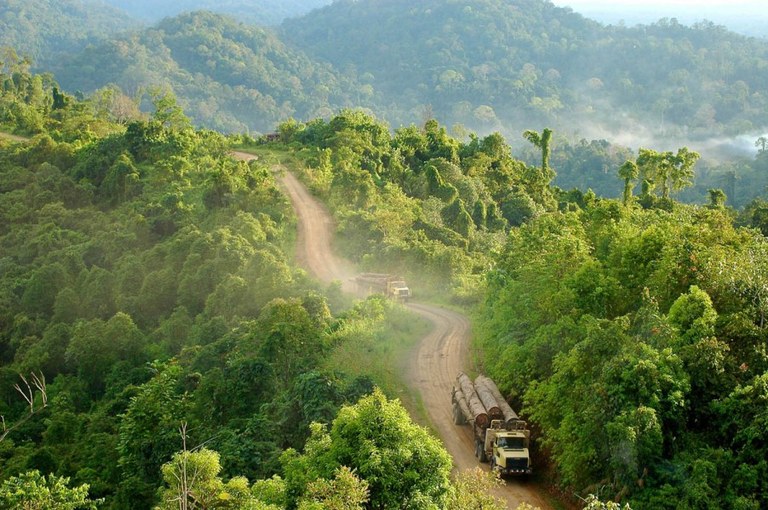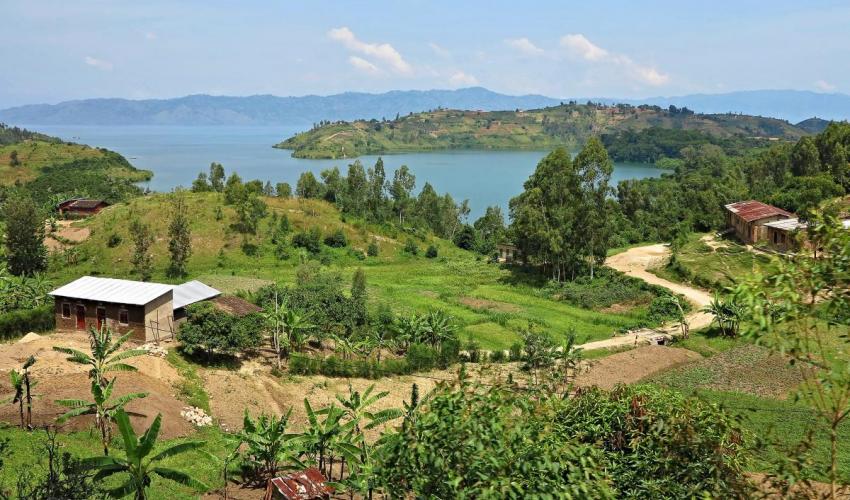In response to this global crisis, Solidaridad is intensifying its efforts in the three big forest biomes: the Amazon, the Malay Archipelago and the Congo Basin. In recognition of the role that indigenous people and smallholder farmers play in conserving our forests, Solidaridad will work with the guidance and free, prior and informed consent of indigenous people and other local communities in these last tropical forest frontiers to tackle the intertwined problems of inequality, deforestation and climate change.

The Congo Basin: a global cause
Central Africa is home to the second largest rainforest in the world after the Amazon: the Congo Basin rainforest, measuring more than two million square kilometres. Including secondary and savanna forests, it measures about three million square kilometres, equalling 75% of the surface of the European Union. It is home to mountain gorillas, lowland gorillas, chimpanzees, and forest elephants, as well as approximately 1,000 species of birds.
These forests are of immeasurable importance for both the region and the world. Holding roughly 8% of the world's forest-based carbon and one-third of the world’s peat, they are a key safeguard against runaway climate change. The Congo Basin also functions as an immense reservoir of fresh water and is one of the three convective regions on the planet that dominate global tropical rainfall during transition seasons. At least sixty million people living in or near the forests directly depend on the Basin’s ecosystem services. Across greater Central Africa, food security directly depends on the Basin’s water resources and its role in regulating the regional climate.
For all its vital functions, the conservation and restoration of the vast Congo Basin forest is a pivotal, global cause.
Drivers of Deforestation
The bulk of the Congo Basin forests (60%) are in the Democratic Republic of Congo (DRC) and the same is true for forest loss. According to a 2018 study, between 2000 and 2014 over 16 million hectares of forest was lost across the Basin. During this period, the DRC alone has seen a higher percentage of forest loss than the other five countries combined (approximately 70%). The average estimated annual area of a forest clearing in the DRC is almost 1 million hectares, with tree cover loss reaching a record high in 2017, increasing 6% from 2016.
It is essential to understand the drivers of this trend; if lessons from the Amazon and Asia apply, deforestation could rapidly accelerate beyond a point of no return.
Small-scale forest clearing for agriculture is the largest direct driver of forest disturbance in the region, contributing about 84% of the total forest loss in the Basin from 2000 to 2014. In the DRC, more than 90% of all forest loss is now due to small-scale clearing for rotational agriculture.
Changing deforestation dynamics
The role of small-scale farmers in deforestation and agricultural expansion is changing. Between 2000 and 2015, production of commodities such as soy, palm, beef, and wood was responsible for about 65% of tropical forest loss.
Despite concerted global action – including legislation, investments, private-sector commitments and voluntary certification schemes – the destruction of tropical forests continues. In fact, deforestation has spiked in recent years. Against this backdrop of a now-or-never moment in halting climate change, the stakes couldn’t be higher: there’s a changing tide in Brazil, accelerating political instability in Central Africa and no obvious gains from RSPO certification in terms of reduced deforestation in Asia.
The role of smallholders in deforestation needs specific attention. First, because the knowledge and wellbeing of local communities are instrumental in halting deforestation. Second, because the relative contribution of smallholders to deforestation has increased in some regions, such as the Brazilian Amazon. And last, in the Congo Basin, more than 90% of all forest loss is now due to small-scale clearing for rotational agriculture.

The role of poverty
Recent research suggests that inequality can be conducive to agricultural expansion. Deprived of a fair income and with the best land taken, poor farmers have few other choices than to expand into increasingly fragile ecosystems and disappearing forests.
In Latin America, factors such as increasing income, land, and wealth inequality erode the land-sparing benefits of increasing productivity. Fighting deforestation, therefore, requires a comprehensive mix of agricultural improvement, pro-poor policies and forest protection laws; productivity increases and forest protection alone do not suffice. In Central Africa, such policies are even more important in view of their potential to reduce population growth.
The bigger picture
Only 5% of all new income from global growth trickles down to the poorest 60%. This is not just an economic issue – undermining people’s ability to be part of and contribute to prosperity – but also an environmental issue. Poverty-driven deforestation is a case in point: poor people will have no choice but to depend on increasingly fragile ecosystems and disappearing forests.
In Europe, a similar pattern is visible. First, the costs of the financial crisis were transferred to taxpayers, while the rich became richer. Now, the costs of mitigating climate change are being transferred to the poorer segments of society. This undermines public support for climate action and decreases people’s access to a sustainable future.
Poor people will also suffer most of the negative effects since they are more vulnerable to the effects of climate change, environmental degradation and environmental pollution.
Resolving this inequality is imperative for creating a healthy and sustainable future for all.
Step up change in the DRC
In view of the large share of Congo Basin forest located in the DRC, the speed of deforestation and the dire state of the country’s politics and infrastructure, the international community needs to step up its efforts in the DRC.
Blended finance at robust scales
Blended finance at robust scales, where donor funding and impact investment meet equity and loans, is the most promising means of investment in places otherwise considered too risky and complex by conventional for-profit investors. Only large-scale multi-stakeholder efforts are capable of developing a robust, inclusive supply-chain infrastructure that brings investment, knowledge, services and market opportunities to farming communities.
The Virunga Alliance in the DRC is a flagship example: it brings together a broad range of public and private stakeholders in order to pool and govern investment in security, tourism, infrastructure, hydropower, agriculture and industrial processing. Crucially, it creates trust, stability and equal opportunity where previously there was none. Solidaridad works with the alliance to develop zero-deforestation oil palm and food systems tuned to local and regional markets.
Get in touch
Solidaridad and partners are working on solutions to create better outcomes for people and nature on the forest frontier. These span the policy arena, agro-industrial investment, local food systems development and ecosystem restoration. Want to learn more? Contact Daniel Knoop at daniel.knoop@solidaridadnetwork.org
Learn more about sustainability in East & Central Africa
This is the final article in a series on deforestation and poverty. Deforestation is responsible for 15% of the world’s greenhouse gas emissions. With the support of the Good Energies Foundation, Solidaridad is working in three key forest biomes to reduce deforestation: the Amazon in Brazil, the Malay Archipelago in Indonesia and the Congo Basin. Small farmers have a large role to play in saving our forests in these areas. Solidaridad works with communities in these tropical forest regions to tackle poverty and deforestation.
Series:
- SMALLHOLDERS CRUCIAL TO PRESERVING THE AMAZON RAINFOREST
- SMALL FARMERS PROTECT UNIQUE FORESTS OF INDONESIA
Made possible by:

